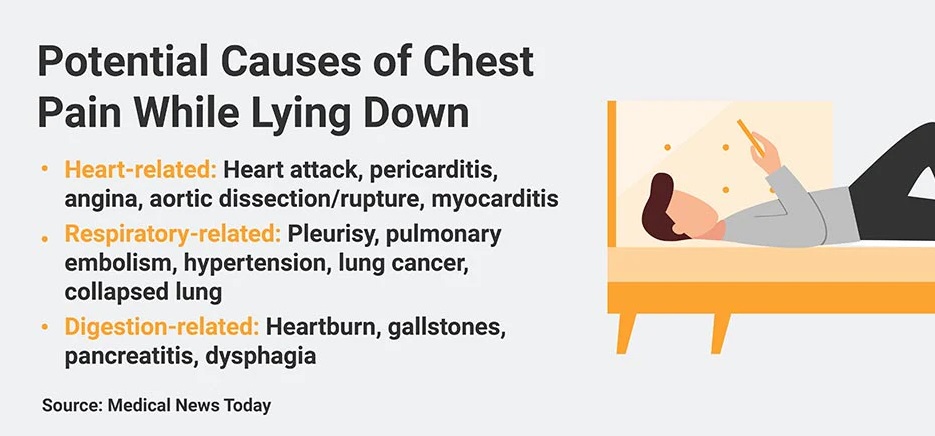
Do you ever wake up with a dull ache in your chest? Why does your chest hurt when lying down? Can bad sleeping position cause chest pain?
Poor posture while sleeping can lead to muscle strain and discomfort that manifests as chest pain. To help you understand how this happens, we’ll explore chest pain caused by sleeping posture, the relationship between poor sleep positions and their effect on our bodies, and when it might be time to see a doctor about any lingering issues.
How can bad sleeping position cause chest pain? Let’s dive into what could potentially be causing these troublesome mornings.
Table of Contents
What Causes Chest Pain?
If you’re experiencing chest pain, it could be due to physical causes such as muscle strain, rib injuries, heart attacks, acid reflux, collapsed lung, and other medical conditions.
Muscle strain is a common cause of chest pain and can be caused by overuse or overexertion during physical activity.
Rib injuries such as fractures or dislocations may also lead to chest pain due to the increased pressure on the ribs when breathing in deeply.
Heart attacks are a serious cause of chest pain that should not be ignored. Symptoms may include tightness in the chest, shortness of breath, sweating, nausea, and vomiting.
Certain medical conditions such as asthma or pleurisy may also result in sharp pains in the chest area when breathing deeply.
If you’re experiencing chest pain that is not due to a physical ailment, then it could be psychological. Chest pain caused by stress or anxiety might have been building up over time.
Panic attacks can cause intense sensations of fear accompanied by rapid heartbeat and difficulty breathing which can manifest itself as a feeling of tightness around the chest, shoulders, neck, and torso area.
Additionally, depression has been linked with feelings of heaviness or pressure around the sternum region which could also lead to chest pain.
How Can Bad Sleeping Position Cause Chest Pain?
Side Sleeping Position
Side sleeping is the most common sleeping position, but it can also be one of the most uncomfortable. When you sleep on your side, your shoulder and hip are in contact with the mattress which can cause pressure points that lead to chest pain. To reduce this risk, make sure you have a supportive mattress and pillow that will keep your spine aligned while you sleep.
Stomach Sleeping Position
Stomach sleeping is not recommended as it puts too much strain on your neck and back muscles which can lead to chest pain. This position also forces you to twist your head for long periods of time, leading to tension headaches or even migraines. If stomach sleeping is unavoidable, try using a thin pillow or no pillow at all so that your neck isn’t bent awkwardly throughout the night.
Back Sleeping Position
Back-sleeping is considered by many experts to be the best sleeping position since it helps keep your spine in its natural alignment while reducing stress on other parts of the body such as shoulders and hips. However, if done incorrectly (such as with an unsupportive mattress), this position can still put a strain on the rib cage, resulting in chest pain. To reduce this risk, make sure you have a good quality mattress and use pillows between your knees for extra support.
 (Source)
(Source)
Tips for Reducing Chest Pain While Sleeping
Investing in a quality mattress and pillow is one of the most important steps you can take to improve your sleep posture and reduce chest pain risk. A good mattress should be firm enough to support your body, but soft enough to cushion it. It should also provide adequate lumbar support for those who suffer from lower back pain.
Additionally, a quality pillow will help keep your neck in alignment with your spine while sleeping on your side or back. Make sure that the pillow you choose is not too thick or too thin, as this could lead to neck strain.
Avoid eating or drinking before bedtime as this can cause indigestion which may lead to chest discomfort during sleep. Eating late at night can also make it difficult for some people to fall asleep due to an increase in energy levels. If you do need something light, try not to consume anything within two hours of going to bed so that your body has time to digest properly before lying down for the night.
Practicing relaxation techniques before bedtime is another great way to reduce chest pain. Taking a few minutes before bedtime can help relax tense muscles and ease any stress-related tension throughout the body.
Examples of relaxation techniques include deep breathing exercises, progressive muscle relaxation (PMR), guided imagery, yoga poses, and listening to calming music — all of which have been found effective at reducing stress levels leading up until bedtime.
At-Home Treatments for Waking Up With Chest Tightness
Waking up with chest tightness can be a worrying experience. It may feel like your chest is being squeezed, or you might have difficulty breathing. Fortunately, there are some at-home treatments that may help relieve chest pain.
If muscle pain is causing your chest tightness, applying a cold pack to the affected area may provide relief from the discomfort. Cold packs reduce inflammation and swelling in muscles which helps alleviate pain and tension in the area. Make sure to wrap the cold pack in a towel before placing it on your skin so you don’t get too cold or cause any damage to your skin tissue.
Heartburn and indigestion are common causes of chest tightness as well. Baking soda mixed with water has been known to neutralize stomach acidity and ease heartburn symptoms quickly when taken orally.
Apple cider vinegar also works similarly but should always be diluted with water first before drinking.
Eating yogurt can also help because it contains probiotics that aid digestion while reducing bloating which often contributes to feeling uncomfortable pressure around the chest and abdomen.
When to See a Doctor
If you experience persistent or severe chest pain while sleeping or after waking up, it is important to seek medical attention. Chest pain can be caused by a variety of physical and psychological issues as well as poor sleeping positions. If the chest pain is accompanied by difficulty breathing or changes in your heart rate or blood pressure, it’s especially important to see a doctor right away.
Conclusion
Can bad sleeping position cause chest pain?
Chest pain can be caused by a variety of factors, including poor sleeping positions. If you are experiencing chest pain and suspect it may be related to your sleep posture, try our tips for improving sleep posture and invest in the right mattress and pillow.
Ultimately, understanding how can bad sleeping position cause chest pain is key to preventing this uncomfortable symptom from occurring in the first place.
If you’re experiencing chest pain, it could be caused by a bad sleeping position. WakeUpFresh.com is here to help! Our guides and how-to information will show you the best ways to improve your sleep quality so that you can wake up feeling refreshed each morning – without any more chest pain.
Check out our website now for tips on improving your posture while sleeping and other advice on getting better rest at night!